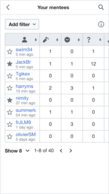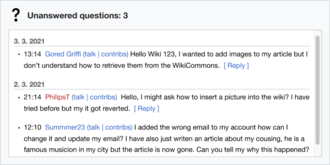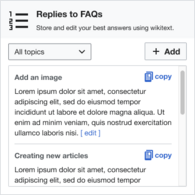Growth/Mentor dashboard/ha
The Growth team launched a newcomer homepage back in May 2019. This homepage includes a mentorship module where newcomers can ask a mentor a question directly from their homepage. Currently, an experienced user can become a mentor by signing up to their wikis mentor list after which they randomly get mentees assigned to them. The mentor does not know which mentee they got assigned until the newcomer reaches out and asks them a question. The team decided to design a mentorship dashboard that could be a central place for mentor tools, which could help improve the mentor's experience on Wikipedia.
|
Mentor dashboard
 Central location for mentor tools
|
Current status
- 2019 - Mentor dashboard planning started: original thinking about the "mentor dashboard" project
- 2020 - Initial designs and research
- - Ƙaddamar da sigar farko na dashboard ɗin jagora zuwa matukin jirgi wikis
- - Aika Jerin Jagora Mai Tsari zuwa duk wikis
- - Saki Kyakkyawan Ƙarfafa Ƙarfafawa zuwa wikis Pilot na Ci gaba
- - Publish Mentorship preliminary analysis
- - Publish Personalized praise experiment results
Background

In 2020, the Growth team spent a day brainstorming for the mentorship dashboard and came up with a list of user stories and possible design ideas. Starting January 2021, the team has set out to create the mentorship dashboard with the aim to equip mentors with:
- data and resources to help them be more proactive and successful at their role
- tools that will help them guide and welcome newcomers
This page will display the most recent work of the Growths team mentorship dashboard project. You can find more information and the project summary you can see the project brief.
Modules
After a round of feedback for the static modules in the previous section, 6 different modules (M) were chosen for the mobile and desktop dashboards. The modules are 1) your mentees, 2) settings, 3) unanswered questions, 4) replies for FAQs, 5) your impact, and 6) resources. Both mobile and desktop dashboards will be very similar and have the same functionality. The only difference is that the mobile version will have a dashboard preview page that will show a preview box of each module stacked on top of each other. Selecting one of the preview boxes will lead you to the module's main screen.
-
Screenshot of the desktop mentor dashboard.
-
Screenshot of the mobile mentor dashboard preview page.
M1: Your mentees - an overview of the mentees activity
![]() Deployed
Deployed
Main objective: For mentors to have the ability to watch the progress of their mentees, be aware of any setbacks, filter through their mentee's data, and allow mentors to be more proactive with their mentoring. This module is the main component of the dashboard that contains a table with the data of the mentor's mentees. The table holds a variety of data points for each mentee, which include: username, recent activity, reverted edits, blocks, questions asked total edits, and tenure. The mentor will be able to filter and sort the data.
-
Screenshot of the module: your mentees (desktop)
-
Screenshot of the module: your mentees (mobile)
M2: Settings - ability to edit the mentor's message, claim a mentee, and change the mentor status
![]() Deployed
Deployed
Main objective: For mentors to have a central place for their tools where they can access them easily. The module is made up of 3 different features...
- Canza matsayin jagora: A halin yanzu, idan masu ba da shawara sun daina ba da jagoranci, waɗanda suke kula da su suna zama a wurinsu. Tare da wannan fasalin, masu ba da shawara za su iya ware kansu kuma su sa wasu masu ba da shawara su amsa tambayoyin mai kula da su, ko kuma idan mai ba da shawara ya daina ba da jagoranci za a sake mayar da su zuwa sababbin masu jagoranci.
- Gyara sakon jagoransu: Wannan shine saƙon da aka nuna akan sabon shafin gidan mai shiga. Ta haɗa wannan a cikin wannan tsarin, yana ba mai ba da shawara damar samun dama da canza saƙon su cikin sauƙi.
- Da'awar mentee. Da'awar mai kula shine fasalin da ya wanzu. Yana ba masu ba da shawara damar zaɓar masu kula da su kuma su sanya kansu a matsayin jagoransu. Duk da haka, ba duk masu ba da shawara ba ne suka san wannan fasalin, don haka ƙara wannan a cikin tsarin zai ba da damar sababbin masu jagoranci su sami sauƙin shiga wannan fasalin.
M3: Unanswered questions - a preview of questions they need to answer
![]() To do
To do
Main objective: For mentors to not miss questions from their mentees and have a central place to preview unanswered questions.
-
Screenshot of the module: unanswered questions (desktop)
-
Screenshot of the module: unanswered questions (mobile)
M4: Replies to FAQs - an answer bank of their template answers
![]() To do
To do
Main objective: For mentors to have a place to store answers for the newcomer’s frequently asked questions (FAQs), save time, and ensure their answers are consistent.
If the mentor has written a well-constructed, and helpful response they save it to the module. The next time someone asks a similar question they can copy the wikitext, paste it to their talkpage and personalize the response there.
-
Screenshot of the module: unanswered questions (desktop)
-
Screenshot of the module: unanswered questions (mobile)
M5: Your impact - showing the total contributions from their mentees, # of questions they have answered, and thanks received from their mentees
![]() To do
To do
Main objective: To showcase the mentor’s progress and show mentors that their efforts are making an impact.
-
Screenshot of the module: your impact (desktop)
-
Screenshot of the module: your impact (mobile)
M6: Resources - top resources for mentoring
![]() Deployed
Deployed
Main objective: To display a list of helpful links to pages that could aid new mentors. Ɗaya daga cikin abubuwan ya kamata ya kasance a kan Ƙungiyoyin Ci gaba MediaWiki shafi, wanda zai taimaka ci gaba da ci gaba da jagoranci tare da sababbin abubuwan da suka shafi sabon shiga / jagora.
-
Screenshot of the module resources (desktop)
-
Screenshot of the module resources (mobile)
M7: Positive reinforcement module
As part of the Positive Reinforcement project, the Growth team will add a new module on the Mentor dashboard to encourage Mentors to send their active mentees encouragement or personalized praise. Personalized praise features are based on research results that show that encouragement and thanks from other users increases editor retention. We will allow Mentors to customize and control how and when "praise-worthy" mentees are surfaced.
-
Design for a new Mentor dashboard module
-
Design of the settings view of the new dashboard module
Discovery & Strategy Phase
Initially, the team looked into relevant studies about mentorship and previous Wikipedia research on this topic. We also looked into the successes and learnings of the Teahouse, Adopt-a-user, and Mentorenprogramm projects. To gain more insight into mentorship and the needs of the community the team interviewed mentors from 7 different wikis and had them share their experience. Below are the main goals and objectives of the interview process.
The Research Goals & Questions
The primary objective was to:
- Understand the mentor's motivations and attitudes regarding mentoring.
- Understand the mentor's processes and behaviors.
- Get to know their general profile.
The secondary objective was to:
- Fahimtar yadda, a ina, da waɗanne hane-hane don tsara dashboard ɗin jagora da.
The Target Audience
We interviewed mentors with a couple of years of editing experience and those who were part of the wikis to which the Growth team has deployed their features.
The Interviews
There were 19 responses to the mentorship questions. 6 of them were written responses while 13 were conducted through online video calls. The team reached out to various communities with the intent to interview diverse mentors from varying continents. Within the 2 week interview period mentors from 7 different wikis reached out (Arabic, Ukrainian, Czech, French, Russian, Hungarian, and Vietnamese). The interviewees were anywhere from 16-60 years old and had 2-18 years of editing experience.
Generally, the interviews lasted no more than 45 minutes and the questions fell under the following 4 categories:
- Fage - Da aka tambaye su game da kwarewar gyara su da dalilin da ya sa suka shiga Wikipedia.
- Motsi - Abin da ya motsa su don fara jagoranci, ko yadda za su motsa wasu bugu don jagorantar sababbin masu zuwa.
- Al'umma - Tambaya game da girman al'umma, ayyuka, tashoshin sadarwa, da jagororin.
- Tambayoyi masu alaƙa da jagoranci - Nemi game da abubuwan takaici na jagoranci na yanzu, shawarwarin dashboard gami da abubuwan so da abubuwan da ba a so.
Interview Results & Analysis
All mentors came from medium to larger-sized wikis. The participants gave 121 suggestions for the mentor dashboard and shared 45 frustrations. Similar suggestions/frustrations were grouped together by topic. There ended up being 26 groups of suggestions as well as 16 groups of frustrations.
The frustrations fell under 3 broader themes:
- Bacin rai ke tafe da masu gadi.
- Bacin rai game da sauran masu jagoranci da halayensu.
- Bacin rai game da gidan yanar gizon da abubuwan da ke akwai.
The top 5 frustrations across all wikis included:
- samun amsa maimaita tambayoyi.
- Masu ba da shawara ba sa amsa tambayoyin masu kulawa.
- Sabbin shigowa waɗanda suka yi kuskuren niyya/daraja kuma ba su fahimci manufar Wikipedia ba.
- Amsoshi gajere da rashin kunya
There were trends seen across some wikis. For example, the majority of the Arabic wiki mentors suggested having personalizable template answers to the most frequently asked mentee questions. The Czech mentors were mostly interested in a dashboard that would have an improved mentee-based notification system, ways to match mentors and mentees by interest, and include other ways to communicate be it online or offline. The Russian mentor was interested in creating a modular dashboard that would have tools to improve the mentor experience with badges & awards and a mentor feedback feature.
Generally, the suggestions fell under 3 main categories:
- Shawarwari waɗanda ke ba masu ba da shawara damar zama masu himma yayin jagoranci.
- Inganta yadda ake yin nasiha gabaɗaya (misali samar da ingantacciyar tallafin jagoranci).
- Inganta sadarwar jagora-mentee
The top 5 suggestions across all wikis included:
- Jerin ma'aikata masu aiki.
- Wuri ɗaya don ganin duk gudummawar da aka bayar.
- Amsoshi ga FAQs.
- Ikon daidaita masu ba da shawara da masu kulawa ta hanyar sha'awa / batu / alƙaluma.
- Samun ƙarin sanarwa (misali samun sanarwa lokacin da shafin mai kula ya ke shirin sharewa, yana komawa, inda akwai tambayoyin da ba a amsa ba, da sauransu.)
Some of the top suggestions would require altering the current newcomer homepage features, which is not what we are looking to do in this first iteration of the mentor dashboard. The purpose of this first iteration was to focus on mentor-specific stand-alone features. Considering this, the suggestions were filtered through and then these ended up being the most frequent mentor specific suggestions:
- Gudunmawar Mentee
- Jerin ma'aurata.
- Amsoshi ga FAQs
- Samun sanarwa game da ayyukan mai kulawa (misali lokacin da shafin da aka soke ya ƙare, an koma baya, da sauransu)
- Bayar da taimako/tallafi ga masu ba da shawara.
This list will inspire the next stage of the project and will guide the design of the dashboard modules.
The first version of static mockups
The first set of static designs showcase 9 different modules, which were inspired from previous research and the top mentor suggestions (mentee contributions, list of mentees, answers to FAQs, being notified of mentee activity, and providing help/support for mentors). At the moment, 9 is too many modules for the dashboard’s first iteration. Ideally, at this stage, we want to decide on 3-5 high-priority modules that will be worked on further and included in the upcoming prototype.
Layout
To have consistency across the Growth team's projects the dashboard will have a similar layout to the newcomer homepage. Right now it has 2 columns with wide and narrow modules stacked on top of each. In the slide deck below you can find the design of the layout and the 9 different modules.

Round of feedback
We are gathering feedback on the content and design of the modules. We are interested in seeing which are the most popular features and whether there are any missing pieces. If you would like to participate and share your opinion with us please feel free to leave comments on the discussion page and answer the following questions.













